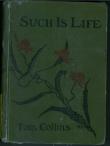 3330840627206942879.jpg
3330840627206942879.jpg
 Rigby's Romance : A Made in Australia Novel
Tom Collins
,
1905
1905-1906
Z1170260
1905-1906
single work
novel
satire
Rigby's Romance : A Made in Australia Novel
Tom Collins
,
1905
1905-1906
Z1170260
1905-1906
single work
novel
satire
Rigby's Romance is a revised and expanded version of the original chapter five in the Such is Life typescript (1898).
The narrator, Tom Collins, is on his way from Echuca to Yooringa to fulfil a contract to clear a Riverina run of cattle. Hoping to meet his old friend, Jefferson Rigby, Collins is surprised by an encounter with Rigby's former sweetheart, Kate Vanderdecken, who has come to Australia in search of Rigby. Collins arranges an introduction before heading to the banks of the Murray River to fish for a thirty-pound cod he has heard is in the area. He is joined by the bullockies Steve Thompson and Robert Dixon, characters from Such is Life, and several others: a kangaroo-hunter named Smith; a trapper named Furlong; a farmer named Binney and his brother-in-law, the Methodist minister Harold Lushington; and, eventually, Rigby himself. Like The Buln-buln and the Brolga, Rigby's Romance involves a series of yarns told in different styles about politics, ethics, religion and law. All hinge in some way on failed love affairs, but, as is his way, Rigby's love story about a local German publican soon evolves into a long sermon on Christian socialism, and he forgets about the appointment he has made with Kate Vanderdecken.
Furphy expressed a preference for Rigby's Romance later in life. Like The Buln-buln and the Brolga, it can be read as an independent work. In revision, Furphy changed the narrative in significant ways, particularly in his expansion of Rigby's sermons on state socialism. In other cases, he probably transferred text from the original chapter two to fill in details at the beginning of the novel. And so, despite its independence as a work, Rigby's Romance retains many cross-references to the larger original work, most notably the presence of Tom Collins as an unreliable narrator.
 The Buln-Buln and the Brolga
Tom Collins
,
Sydney
:
Angus and Robertson
,
1948
Z969858
1948
single work
novella
The Buln-Buln and the Brolga
Tom Collins
,
Sydney
:
Angus and Robertson
,
1948
Z969858
1948
single work
novella
The Buln-buln and the Brolga is a long story that is a revised and expanded version of the second chapter of the original Such is Life. The action takes place in the township of Echuca where the narrator, Tom Collins, is waiting to meet a representative of the firm for which he works. While waiting for his associate to arrive, Collins meets a childhood friend, Fred Falkland-Pritchard, the titular buln-buln or lyrebird, so-called because of his reputation for lying. Tom also meets Barefooted Bob, the titular brolga. The three spend an evening together with Fred's wife, and the two swap yarns. Fred's yarns get taller and taller, but Bob accepts them as the truth, as Fred's wife has done throughout their marriage. Bob tells stories of violent encounters with Aboriginal people on the frontier, delivered with a bluntness that intrigues Mrs Falkland-Pritchard. The story can stand on its own as a study of an individual's perception of reality, specifically the fiction of reality or the reality of fiction. But it retains intriguing links to its original version in the typescript, made even more so by Furphy's methods of transferring sections of text during revision.
 The Buln-Buln and the Brolga and Other Stories
Tom Collins
,
Adelaide
:
Rigby
,
1971
Z123839
1971
selected work
novella
short story
The Buln-Buln and the Brolga and Other Stories
Tom Collins
,
Adelaide
:
Rigby
,
1971
Z123839
1971
selected work
novella
short story
